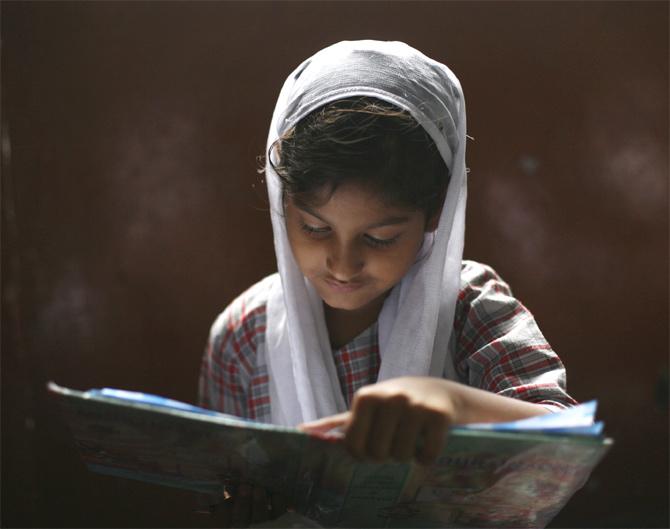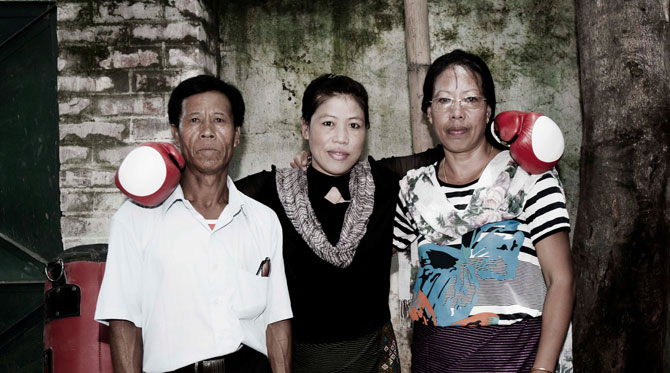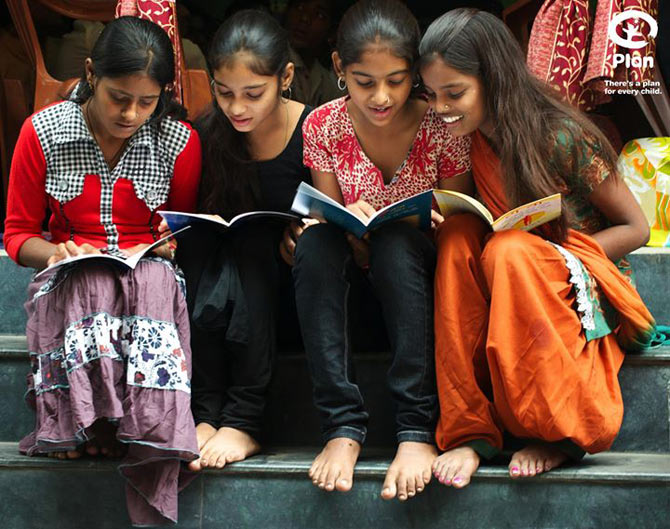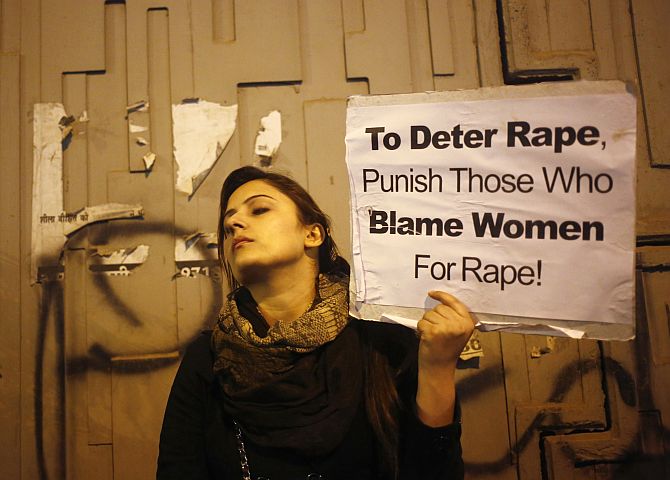
'Between the ages of three and 14, a vast majority of girls are molested by people who are closely known to their families.'
'By the time they realise that they have been molested or abused, they feel it's too late.'
'No matter how severe the nature of the crime, people always blame the women -- which is depressing. Each one of us is to blame for this.'
'Every woman has the right to wear and dress up the way she wants to. That is no incentive to rape.'
This Women's Day, Bhagyashri Dengle, Executive Director, Plan India appeals to India to love and respect its daughters.
Plan India, a New Delhi-based non-governmental organisation is involved with a national-level campaign to protect the rights of the girl child through awareness, literacy and employment initiatives.
Ahead of International Women's Day, on March 8, Bhagyashri Dengle, Executive Director, Plan India, left, below, tells Rediff.com's Divya Nair about what can be done in the family, workplace and society to give Indian girls and women their rightful place in society.
Plan India's most recent initiative is Meri Beti Meri Shakti, a book that features 41 Indian personalities, including Amitabh Bachchan, Sharmila Tagore, Anil Kapoor, Neerja Birla, Lillete Dubey and Kapil Dev, who share their experiences as parents to daughters.
Read more about it here!
What is the purpose behind launching Meri Beti Meri Shakti?

The coffee table book is part of a larger pan-India initiative, our 'Because I am a Girl' campaign to educate and create awareness about the need to educate and empower the girl child.
We all know about the dwindling sex ratio in India -- there are only 914 girls for every 1,000 boys.
More than 50 per cent of girls don't complete their education because of social and family pressures, marriage and kids or due to financial challenges.
Every alternate day, we read in the newspapers how young girls in our country are killed even before they are born because parents and families don't want to invest in a girl child.
Meri Beti Meri Shakti aims to break this mould and inspires parents to give their daughters the opportunity to prove their talent and live their dreams.
Please click NEXT to continue reading...

Can you share memorable experiences of working on the book?
Working with Mary Kom was an inspiring experience for the team.
Despite her gruelling schedule, she allowed us to travel all the way to her hometown so that we could click a picture of her with her family.
The photograph we clicked with her parents Mangte Tonpa Kom and Mangte Akham Kom is perhaps one of the best in the book.
Her parents were poor farmers in Manipur and Mary Kom had to undergo a lot of hardships to complete her education and pursue boxing.
She could have called it quits and been a happy mother, but she chose not to.
Her story sends a very strong message of a family being proud of its daughter who struggled against the odds and conquered her dream.
Each story is inspiring and so are the personalities sharing their experiences.
Please click NEXT to continue reading...

What issues do Indian women face on a day-to-day basis?
At school, violence toward women is often sidelined as part of the grooming and personality development process.
Through our research and surveys, we have found that one out of three children is beaten up in school, which has a negative impact on their future and career.
Between the ages of three and 14, a vast majority of girls are molested by people who are closely known to their families.
Most don't speak up because of the stigma attached to it.
By the time they realise that they have been molested or abused, they feel it's too late.
In most cases of victims we have counselled believe the crimes happened because there was something wrong about them and not because the oppressor had an evil intention.
How different are women's issues at the rural level?
While people in cities have both the means and access to education and employment, those in the villages have to struggle for it.
Also, I have observed that women in villages have the desire to learn and succeed, which I feel is missing in urban women.
For instance, in the Khunti district of Ranchi, where we organised a literacy programme for tribal women, we realised that women were up by 4 am (to fit in their chores and attend the programme).
They did not complain about lack of sleep or the burden of household chores as long as they were able to learn a few things.
Through our various sensitisation camps where we involve adolescent girls, we realised that every year 10 to 15 girls in villages of Jharkhand and other northern states fall victim to human trafficking.
No one knows where these girls are traded and who are the people involved.
Timely investigation and legal action can be taken only if people in the neighbourhood report it.
There has to be a proper reporting mechanism for whistleblowers -- a reward or compensation maybe.
Where has a social initiative you led made a significant difference?
In 1996, I met a family of four sisters and one brother in a rural district of Himachal Pradesh.
The eldest sister was 10 years old and was attending a photography workshop organised in association with the Bal Panchayat.
When we asked the kids what they aspired to become when they grew up, this particular girl raised her hand and said: 'I want to be a radio jockey.'
She explained to us that she aspired to be the voice she heard on the radio.
The girl belonged to the family of a daily wage labourer. We decided to sponsor the education of the five siblings.
Although the eldest one did not become a radio jockey, she completed her post graduation and so did all her sisters and brother.
The brother works in the Indian Army. All the sisters are independent professionals settled in Delhi and Dehradun.
Every time they visit their village, they talk to the rural folk and ask them to send their girls to school so that they can complete their education.
All that the girls needed was a simple push in the right direction and they were able to carve their own destinies.
The girls connect with me on Facebook and continue to update me about their successes.
Please click NEXT to continue reading...

Is there an increase in the number of rapes? What can be done about it?
Rapes have been happening since centuries now, but they have been happening quietly because Indian women have a natural tendency to suffer in silence.
Those who raised their voices were looked down upon and disowned by their families and the society they lived in.
No matter how severe the nature of the crime, people always blame the women -- which is depressing. Each one of us is to blame for this.
It's an attitudinal thing to look at women as commodities and/or species that have no right or dignity to life. That has to change.
Every woman has the right to wear and dress up the way she wants to. That is no incentive to rape.
As a responsible citizen, if you see something is wrong, you must stand up against it, question it and inspire change.
Change may not happen overnight, but it will happen over time.
Correspondingly, we must instil and encourage in our women the importance of zero tolerance.
What issues do Indian women face at work and what can they do about it?
Discrimination and exploitation at the workplace is regarded as a less serious offence. This happens across sectors where women are offered lower compensation, denied promotion and perks.
Women do not speak up against an oppressor because it may affect their career.
Gender committees need to be set up in every organisation so that women can raise and discuss their concerns with the management.
There must be fair investigation of molestation cases. The panel must have a fair representation of women and men.